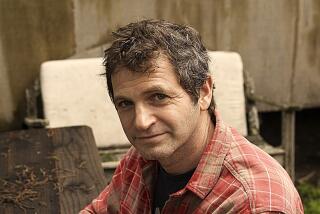John Scalzi on writing great big books
- Share via
Writer Alan Moore, perhaps best known for the classic “Watchmen” graphic novel, has this month released a novel, “Jerusalem,” to generally very positive reviews. There are many words to describe the novel (“epic,” “Joycean,” “vast,” and “show-offingly brilliant” are some of them) but the one word I think that every reader and critic of the work can agree is accurate with regard to the book is “long.” “Jerusalem” clocks in at over 600,000 words, a length that dwarfs such monster books as “Ulysses” (a mere 265,000 words), and exceeds “Shogun,” “Infinite Jest,” “War and Peace” and either the Old or New Testament individually (but not together).
Even the current gold standard for doorstop novels, the 1,100-page “A Dance with Dragons,” the most recent installment of George R.R. Martin’s “Song of Ice and Fire” series, is a comparatively anemic 420,000 words. While Moore was composing the book, the rumor was that it was actually a million words long, which, if true, means that for the completed version, a Martin-sized piles of words was edited out to get it to its current length. Which is a staggering thought.
Given that Moore produced between 600,000 and a million words to generate “Jerusalem,” it’s not entirely surprising to learn that he reportedly spent 10 years writing the novel. When you see the book in the flesh, with a spine the width of a cellphone, you don’t have any doubt that time was invested in the making.
An interesting question to ask, however, is: How does that pace compare with others who write novels? Is 10 years for a 600,000-word-plus novel actually a massive undertaking? Or is it, as a matter of simple word count, a fairly standard level of output among novelists?
Yes, and yes.
The first thing to note here is that the word “novel” is a highly fungible term. It’s generally understood to mean a fiction work greater than 40,000 words long. For modern fiction publishing, which wants to have physical hardcover books of a certain size, 60,000 words is the useful minimum, and 100,000 words is about average. Some genres are typically shorter than that average (romance and young adult, for example) and some longer (fantasy, for which the consumer really appears to prefer doorstops). But at the end of the day, a novel can be as short as 40,000 words or as long as, well, “Jerusalem.”
When a single word encompasses such a wide range of objects, it has the effect of skewing people’s expectations. I’m a fairly standard working novelist, in that I publish about a novel a year. In one decade, from 2006 to 2016, I wrote eight novels; Alan Moore wrote one. In terms of novel-sized objects, it appears that I have vastly outpaced Moore, by a ratio of 8 to 1. But my novels ranged in length from about 75,000 words to about 130,000 words, with an average of about 90,000 words. So across eight novels, I’ve written — or at least, had published — about 720,000 words in novel form. Moore, on the other hand, published more than 600,000.
I still outpace Moore in word count, but not by all that much — by around a novel length (mine, not his). Keypress to keypress, his pace of writing — his pace of producing words that are worthy of publication — is similar to mine. We’re writing more or less the same amount; he just piled them in one book while I sliced them up into eight. As it happens, George R.R. Martin keeps a similar pace to me and Moore; he wrote 420,000 words for “A Dance with Dragons” in the same amount of time it took me to write 450,000. I put them into five books, and he put them one.
This is one reason why I as an author get a little exasperated at readers and fans who become upset or even angry that their favorite writers of very large books appear to be taking their sweet time between installments. They’re not; they’re writing as much and at about the same pace as many other highly productive (i.e., frequently published) authors. It’s how the words are packaged up that matters.
Note well this is a highly reductive way of looking at novel writing; there’s more that goes into novel writing than the mere act of putting words on a page, even if ultimately that’s a most concrete metric. Novels take the time they take, and every writer has a different writing speed. It’s the output that ultimately matters, not the process.
But I will say, as a working writer, I like the idea of Moore and Martin plugging away at their massive tomes at more or less the same pace as I do with my own words, when I’m dodging the kittens trying to sit on my keyboard out in Ohio. We divvy them up differently is all, and hope the readers want us to do it some more.
Scalzi, one of our Critics at Large, is a bestselling, prizewinning author. His recent works include the 2015 installment in his Old Man’s War series, “The End of All Things.”
More to Read
Sign up for our Book Club newsletter
Get the latest news, events and more from the Los Angeles Times Book Club, and help us get L.A. reading and talking.
You may occasionally receive promotional content from the Los Angeles Times.











